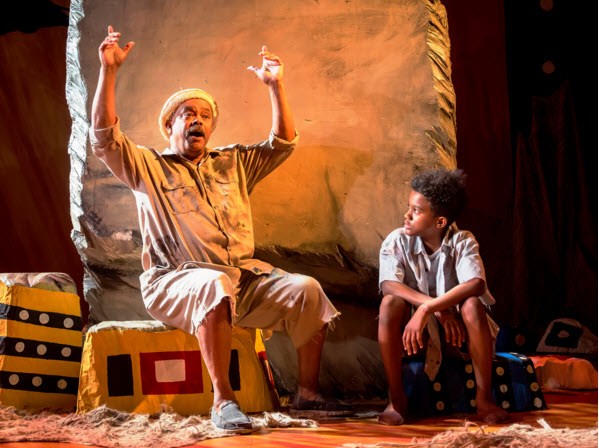Jordan Wright
September 3, 2019
The ghost of Nelson Mandela hovers over MetroStage with the area premiere of Athol Fugard’s most recent play, The Painted Rocks at Revolver Creek . This compelling drama set during South Africa’s apartheid period places us amid the racially-charged détente that existed between white Afrikaner farmers and black Africans. It was this lopsided political domination of the natives by a tiny percentage of Dutch and German settlers that resulted in the loss of property, enslavement and, ultimately, unspeakable violence. Fugard based his drama on the true story of a farm laborer, Nukain Mabuza, famed for his vivid paintings on boulders and stones of the region.

Doug Brown ~ Jeremiah Hasty
Photo credit: Chris Banks
Nukain, called “Tata” by the orphan boy, Bokkie, has toiled in servitude to a bible-toting Christian, Elmarie Kleynhans, a Dutch farmer and her husband. Tata has walked the land of his ancestors looking for odd jobs and digging for gold for the white man for a scrap of bread and a place to lay his head. Eventually, he finds work as a handyman for Elmarie. While there, he gifts the child with the knowledge of the old ways – African chants and dances to strengthen his spirit. To strengthen his own spirit, he paints rocks with flowers and aboriginal memories and recounts tales of the land that once belonged to his ancestors.

Photo credit: Chris Banks
Act One is set in the small koppie on the farm at Vredewater. It is 1981 in the Revolver Creek area of the Mpumalanga Province outside of Johannesburg and the old man is agonizing over what to paint on the biggest rock in the garden. Elmarie orders him to paint large flower for her expected guests, but Tata wants to paint his life story in symbols. Bokkie gets angry that Tata won’t tell her his intentions. Cautioning the boy not to voice his opinions to the masters, he warns, “They have eyes, but they do not see us.”
Lighting Designer Alexander Keen and Set and projection Designer Patrick W. Lord, create an atmospheric backdrop in hues of red, blue, gold and green to evoke the dramatic South African landscape and the shifting moods of the characters.

Photo credit: Chris Banks
Act Two is set in 2003, after Mandela has been released from prison and the country has been liberated as the New South Africa. Now an educated man, Bokkie returns as Jonathan Sejake to face Elmarie and restore Tata’s legacy.
Director Thomas W. Jones has put together a powerful cast to bring to life this deeply transformative tale that reverberates with emotion as it guides us through the appalling legacy of racism in South Africa and, in the second act, the soul-lifting deliverance of redemption.

Photo credit: Chris Banks
Highly recommended. With outstanding performances by Doug Brown as Nukain (Tata), Jeremiah Hasty as the young Bokkie, Marni Penning as Elmarie Kleynhans, and Jeremy Keith Hunter as Jonathan Sejake (Please somebody cast this brilliant actor as Hamlet!). Sound Design by Gordon Nimmo-Smith with costumes by Michael Sharp.
Through September 30th at MetroStage, 1201 North Royal Street, Alexandria, 22314. For tickets and information visit www.metrostage.org.